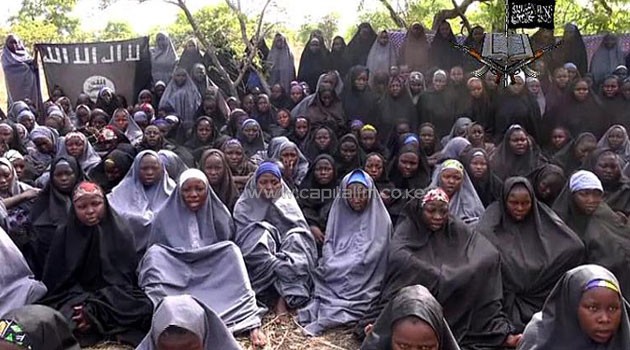
A screengrab taken on May 12, 2014, from a video of Nigerian Islamist extremist group Boko Haram obtained by AFP, claims to show kidnapped girls wearing the full-length hijab in an undisclosed rural location/AFP
LAGOS, May 13 – Conditions set out by Boko Haram’s leader for the release of the Nigerian schoolgirls held hostage by the Islamists may lead to a deal that sees the girls freed, analysts said Monday.
In a new video obtained by AFP, the group’s leader Abubakar Shekau said the girls may be released once Nigeria frees all the Boko Haram prisoners it has in custody.
The government rejected that proposal and said it was not interested in any conditions dictated by the extremists who have killed thousands in a five-year uprising and claimed the shocking April 14 mass abduction in the northeastern town of Chibok, Borno state.
On the subject of talking to Boko Haram, Nigeria has sent contradictory messages in the past.
Months after claiming that dialogue with the Islamists was impossible, President Goodluck Jonathan last year tasked a high-level panel with negotiating a ceasefire, an offer ultimately rejected by Shekau. READ: [Video] New Boko Haram video shows missing schoolgirls.
Shehu Sani, an expert on Boko Haram and religious violence in northern Nigeria, wrote last week that the Islamists were likely to demand a prisoner release in exchange for teenage girls seized from their school in Chibok.
“A deal can be reached with the insurgents on this issue,” Sani told AFP.
Nigeria’s military has been accused of rounding up thousands of Boko Haram suspects, including women and children, and holding them in atrocious conditions that have been criticised by rights groups.
Shekau has also made prisoner exchange demands before. An early example came in 2011, when Boko Haram wrote an open letter to the governor of northern Kano state, demanding the release of detainees.
Sani said Boko Haram detainees can be divided into three categories: senior insurgent commanders, foot soldiers and families members of Boko Haram leaders.
The government should release members of this third group “as a gesture”, provided it was tied to the release of some of the Chibok hostages, Sani said.
Elizabeth Donnelly, of the Africa Programme at the London-based think-tank Chatham House, agreed that a prisoner-for-hostage swap was “worth exploring”.
“They need to take any opportunity they may have because this is about the lives of more than 200 children,” she said.









































